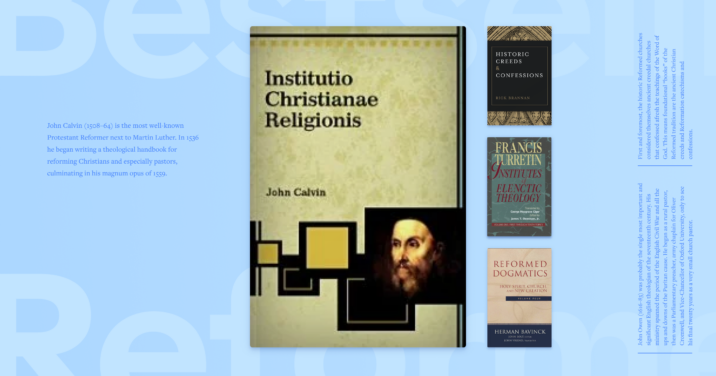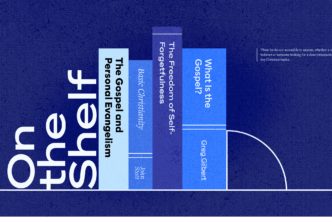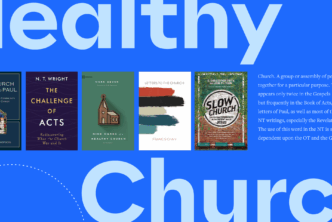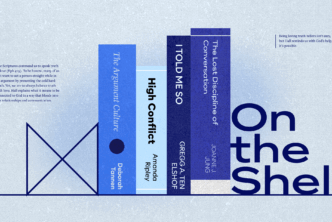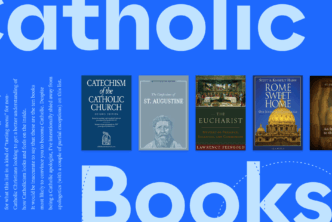What does it mean to be “Reformed”? What even is Reformed theology? Spend any amount of time in Christian spaces on social media, and you’ll soon see that confusion and caricatures abound. Many who presume to speak authoritatively about Reformed theology have never actually read the basic theological texts within the tradition.
A while back on Word by Word, I sought to answer the question, “What is Reformed theology?” We traced some history, key ideas, and influential leaders. Here, I would like to give you a select reading list of the most notable and important books within the Reformed tradition that you need to know to have an informed understanding of what “being Reformed” or what “Reformed theology” is all about.
I write as one who was previously an outsider to the Reformed tradition. But through various twists and turns (you can read about my theological journey here), I found my way into a Dutch Reformed church. Eventually, I did a PhD at the world’s top Dutch Reformed university where a couple of the authors below taught. I will soon reach a tipping point in my life when I will have pastored the Oceanside United Reformed Church for over half of my life. I guess this makes me the guy to write this list!
My two qualifications are, first, the Reformed tradition is large enough for others to write a completely different list of books that “everyone should know.” There are so many significant books that it would be impossible to include them all. I’ve chosen those that I think will both help the complete newcomer as well as the person looking to go deeper into Reformed theology, liturgy, piety, spirituality, and ecclesiology.
Second, my list is no doubt skewed by my preferences as well as my experience as a pastor and writer in the Dutch Reformed tradition.
Table of contents
Creeds and confessions
1. Historic Creeds and Confessions, by Rick Brannan
First and foremost, the historic Reformed churches considered themselves ancient creedal churches that confessed afresh the teachings of the Word of God. This means the foundational “books” of the Reformed tradition are the ancient Christian creeds and Reformation catechisms and confessions.
As for the creeds, the Belgic Confession says,
in this matter [of the Trinity] we willingly accept
the three ecumenical creeds—
the Apostles’, Nicene, and Athanasian—
as well as what the ancient fathers decided [e.g., Definition of Chalcedon]
in agreement with them. (Belgic Confession, Article 9)
Historic Creeds and Confessions by Rick Brannan contains these ancient documents:
1. The Apostles’ Creed
Despite its name, what we call the Apostles’ Creed was not written by the apostles. It began as the confession of faith that converts recited before their baptism. Over the centuries, it developed into its current form. It is still used in catechesis (instruction) of converts and children raised in the church.
2. The Nicene Creed
“The Creed” was first developed at the Council of Nicaea in 325 in response to the teachings of Arius and his followers, who denied that the Son was as divine as the Father (equivalent to modern Jehovah’s Witnesses theology). Later, when another group known as the Macedonians denied the full deity of the Holy Spirit, the Council of Constantinople was called in 381, resulting in the Niceno-Constantinopolitan (or “Nicene,” for short) Creed.
3. The Athanasian Creed
Like the Apostles’ Creed, the Athanasian Creed was not written by Athanasius, but is a representation of his teaching on the Trinity and the person of Christ. The creed is mentioned as early as the sixth century and became a standard part of Latin-speaking churches under Charlemagne in the late-eighth century. Its importance is it contributes a fuller confession of the triune God we worship: “Now this is the catholic faith: that we worship one God in Trinity and the Trinity in unity.” In addition, it expresses what it means that the Son is both divine and human.
4. The Definition of Chalcedon
The last ancient document is the Definition (or Symbol) of Chalcedon from the Council of Chalcedon in 451. This council was called in response to confusion and various views throughout the Roman Empire on what it meant for Christ to be both divine and human. Chalcedon expresses that in the one person of Christ are two natures: “unconfusedly, unchangeably, indivisibly, inseparably.”1
As creedal churches, the historic Reformed churches also confessed truths of the Word of God concerning the theological controversies of their times. They did this in various documents called catechisms, confessions, and canons. The following set is referred to as the Three Forms of Unity.
5. The Belgic Confession
The Belgic Confession is the first of the “Three Forms of Unity.” Guy de Brès wrote this confession in 1561 for the early Reformed churches in what is today Northern France and Belgium. It expresses the ancient faith in a fresh way. Brès appended a letter to the ruler of the Lowlands (N. France, Belgium, Luxembourg, The Netherlands), King Philip II of Spain, expressing its purpose to demonstrate that the Reformed churches were not trying to foment insurrection but simply seeking to follow the Word as confessed by the ancient church. It teaches about God, his revelation, the Word, the Trinity, Jesus, salvation, the church, sacraments, the relationship of the civil magistrate to the church, and the last things.
6. The Heidelberg Catechism
The Heidelberg Catechism is well-known for its opening question: “What is your only comfort in life and in death?” The Catechism was produced in 1563 for the Palatinate region of the Holy Roman Empire. Its purpose was to unify churches in the Reformed confession of the Christian faith and provide a teaching tool for ministers at church (we still use it for sermons), teachers at school, and parents at home. The Heidelberg follows the rubrics of misery, deliverance, and thankfulness—or “guilt, grace, gratitude”—as it expounds the law (Jesus’s teaching on the great commandment in Matthew 22), the gospel (the divine-human Mediator, The Apostles’ Creed, justification, and sacraments), and gratitude (Ten Commandments and Lord’s Prayer).
7. The Canons of Dort
The Canons come out of the long controversy within the Dutch Reformed church involving Jacob Arminius and his followers. Since similar controversies had been active in other parts of Europe at the time, an international Synod was called from November 1618 to May 1619. Dort took up the issues of divine predestination, Christ’s death and the sins of the world, the depths and extent of human sin, the work of the Holy Spirit in calling and regenerating sinners, and finally, the preservation and perseverance of the saints.
2. Westminster Confession of Faith and Larger and Shorter Catechisms
Alongside the Dutch Reformed Three Forms of Unity stand the Scottish and English Reformed Westminster Standards. Westminster Assembly (1643–53) produced the Standards when tasked with reordering and reforming the Church of England during the Civil War (sorry, Anglicans!). The result was its monumental confession (replacing the “Anglican” Thirty-Nine Articles) as well as two catechisms: the Shorter, intended for children, and the Larger, intended for fathers and instructors to go deeper and stay ahead of their children and pupils. “What is the chief end of man?” All Christians need to learn this question and its answer: “To glorify God and to enjoy him forever.”
Westminster Confession of Faith | WCF (including the Larger and Shorter Catechisms, American Revision, 3 vols.)
Regular price: $17.99
Expositional works on the confessions
After reading the historic Reformation catechisms, confessions, and canons, questions are going to abound. One way to dig deeper into their background history, theology, and how they apply to you is to read some historic and contemporary expositional works.
3. A Firm Foundation: An Aid to Interpreting the Heidelberg Catechism, by Caspar Olevian
Caspar Olevian (1536–87) was chief preacher at the Holy Ghost Church in Heidelberg and part of the committee that wrote and edited the Heidelberg Catechism. His A Firm Foundation is an understandable series of expositions and applications of major parts of the Catechism. This book will give you a sense of how deep and devotional the Catechism truly is.
A Firm Foundation: An Aid to Interpreting the Heidelberg Catechism
Regular price: $19.99
4. Commentary on the Heidelberg Catechism, by Zacharias Ursinus
Zacharias Ursinus (1534–83) was also a preacher at the Holy Ghost Church in Heidelberg but was especially its chief theologian. Considered the main author of the Heidelberg Catechism, his lectures through the Catechism give us the best commentary available. Although David Paraeus, his greatest student, along with others compiled multiple editions (which need to be sorted out by scholars in a critical edition determining who wrote what), this commentary is invaluable in understanding the Heidelberg.
5. An Introduction to the Heidelberg Catechism: Sources, History, and Theology, by Lyle D. Bierma, Paul W. Fields, Charles D. Gunnoe Jr & Karin Maag
This volume, produced by a team of writers, serves as one of the most current pieces of scholarship on the Catechism. The authors delve into the history of the Palatinate region of the Holy Roman Empire, its part in the Reformation movement, who wrote the Catechism, and its sources and translations. Most importantly, this volume includes translations of two of the most important sources of the Catechism: Ursinus’s Smaller and Larger Catechisms.
An Introduction to the Heidelberg Catechism: Sources, History, and Theology
Regular price: $29.99
6. The Belgic Confession: Its History and Sources, by Nicolaas H. Gootjes
The Belgic Confession is the least well-known of the Three Forms of Unity. This is in part because the intense political and ecclesiastical persecution that characterized the circumstances of its writing clouds the Confession’s exact authorship and history. Professor Gootjes’s book gives us helpful information on the Confession’s background history, authorship by Brès and others, various sources, how the Confession was revised, and its relation to the church in Geneva under John Calvin and Theodore Beza.
7. A Faith Worth Defending: The Synod of Dort’s Enduring Heritage, by Jon D. Payne & Sebastian Heck
A recent and popular guide on the Canons is A Faith Worth Defending. Professor W. Robert Godfrey gives an important essay on the background history while Prof. Lyle Bierma lays out an historical and theological comparison of the Three Forms. Following the outline of Canons themselves, the book also contains chapters on election and predestination, human sin, the gospel of Christ’s death, the Holy Spirit, preservation/perseverance of the saints, as well as practical chapters on assurance, preaching, and evangelism.
Reformation era books
8. The Institutes of the Christian Religion, by John Calvin
John Calvin (1508–64) is the most well-known Protestant Reformer next to Martin Luther. In 1536, he began writing a theological handbook for reforming Christians and especially pastors, culminating in his magnum opus of 1559. The Institutes is a classic work of the Christian tradition, tracing theology and ethics in four books. Calvin deals with the knowledge of God, Christ the Redeemer, the work of the Holy Spirit, and the Church.
The Institutes of the Christian Religion: English, Latin, and French (9 vols.)
Regular price: $79.99
9. Tracts and Treatises, by John Calvin
Calvin was a voluminous writer, and a large collection of his important writings are found in his tracts and treatises. These deal with the issues of his day, necessitating reformation of the Western Catholic church. Treatises deal with the doctrine of the sacraments and especially his response to the Roman Catholic Council of Trent, which condemned the Reformation, forever cutting off Reformed Catholics from Roman Catholics.
10. The Letters, by John Calvin
Another source of primary material is Calvin’s letters. Here you will find letters to political leaders, fellow scholars and theologians throughout Europe, and laypeople seeking to know Calvin’s thoughts on various issues. These letters give us a glimpse into the inner man of John Calvin.
11. Commentary on the Book of Psalms, by John Calvin
Calvin was a major biblical commentator, writing commentaries on most of the Bible. I’ll mention just one: his Commentary on the Book of Psalms. He famously called the Psalms “an anatomy of all the parts of the soul.”2 In the Psalms, we hear expressions of the joys and sorrows of human beings in relationship with God in this world. This commentary displays Calvin at his best, commentating, explaining, and applying the Word to his listeners with insights that echo down the corridor of time.
12. The Decades, by Henry Bullinger
Henry Bullinger (1504–75) succeeded Ulrich Zwingli as chief preacher in Zurich. The Decades are five sets of ten sermons each that trace the biblical truths of the Word of God. Bullinger’s work gives you a sense of what it was like to hear the Reformation preached in the sixteenth century.
Reformed orthodox books
13. Institutes of Elenctic Theology, by Francis Turretin
Francis Turretin (1623–87) succeeded Theodore Beza, who succeeded John Calvin as chief teacher in the Academy of Geneva. Turretin’s Institutes are similar in name to Calvin’s, but the difference is he wrote in an “elenctic” way; meaning, he discussed topics of theology by dealing with objections and refutations from other views. You’ll also notice a different style than John Calvin. This is because Turretin wrote in what we would call an “academic” or “scholastic” way, meaning he wrote in an academic setting for students of theology, whereas Calvin wrote his Institutes for pastors.
Books by Scottish Presbyterians
14. The Works of Robert Traill
Traill (1642–1716) was a popular Scottish Presbyterian “Covenanter” minister who suffered much persecution after the English monarchy and the Episcopal church were restored in 1660. I especially want to point out his Vindication of the Protestant Doctrine of Justification in volume 1. This defense of the classic orthodox doctrine against the charge of antinomianism (that preaching justification by faith alone would lead Christians not to seek to obey God) is succinct and pastoral. He said,
I have no name to come to God but in Christ … having no plea but Christ’s name, no covering but his borrowed and gifted robe of righteousness. I need nothing, I will ask nothing, but what his blood hath bought.3
15. The Marrow of Modern Divinity, by Edward Fisher
While Edward Fisher was English, the Scottish Presbyterian Thomas Boston later annotated Fisher’s work. Fisher styled it as a dialog between a minister of the gospel (Evangelista), a young Christian (Neophytus), a legalistic Christian (Nomista) who believes Christianity is a set of rules to be obeyed, and an antinomian “free grace” Christian (Antinomista) who believes he’s free to sin because God will forgive him anyway. The interlocutors quote Martin Luther and English Reformed theologians extensively, emphasizing the sovereignty of God in the covenant of grace, the free offer of the gospel, assurance of salvation in Christ as part of the essence of faith, and the Christian’s sanctification by grace rather than by the law.
Books by English Congregationalists
John Owen (1616–83) was probably the single most important and significant English theologian of the seventeenth century. His ministry spanned the period of the English Civil War and all the ups and downs of the Puritan cause. He began as a rural pastor, then was a parliamentary preacher, army chaplain for Oliver Cromwell, and vice-chancellor of Oxford University, only to see his final twenty years as a very small church pastor. Significant among his massive twenty-four-volume Works are the following practical writings:
16. The Glory of Christ, by John Owen
In The Glory of Christ, Owen meditated on the God–man, Jesus Christ, as the heart of the gospel for sinners.
17. On Communion with God, by John Owen
On Communion with God is a treatise on how the believer has distinct fellowship with each Person of the Holy Trinity.
18. The Works of John Owen, Vol. 9: Sermons to the Church
In these sermons, you can hear this theological giant’s voice from the pulpit on a whole host of subjects and texts.
19. The Holy Spirit: The Comforter, by John Owen
In The Holy Spirit, Owen deals polemically with certain views on the necessity of written forms of prayer. But as he does so, he writes such profound things about the immediacy of the Holy Spirit in the life of the praying believer, anticipating modern evangelical/Pentecostal views.
The Holy Spirit: The Comforter (The Complete Works of John Owen, vol. 8)
Regular price: $31.99
Books by Neo-Calvinists
Neo-Calvinism was a movement within the Dutch Reformed Church begun in the late-nineteenth century that sought to revive Reformed orthodoxy in fresh ways for its own time. This led to a revival of thinking theologically about all of life, where Calvinists like Herman Bavinck and Abraham Kuyper sought to apply the confessional orthodoxy of the Three Forms of Unity to its every sphere (church, state, family).
20. Reformed Dogmatics, by Herman Bavinck
Herman Bavinck (1854–1921) was certainly the most significant Dutch Reformed theologian of the late-nineteenth century, and perhaps throughout all of Europe. His Reformed Dogmatics took the confessional Reformed orthodoxy of the sixteenth and seventeenth centuries and brought it forward to his generation in a faithful and fresh way. It is a massive four-volume set, but worth the investment of your time.
21. Calvinism, by Abraham Kuyper
Abraham Kuyper (1837–1920) was the energetic visionary of the Neo-Calvinist movement. A pastor, Prime Minister, founder of the Vrije Universiteit Amsterdam (Free University), journalist, and theologian, Kuyper left his mark on his own country in his time and continues to impact us today.
Kuyper’s most well-known work in the English-speaking world was a series of lectures at Princeton University. In these lectures, he sought to demonstrate that “Calvinism” (which he used as a broader category than Reformed orthodoxy) ought to function as a whole-of-life system, impacting religion, politics, science, and art.
22. Our Worship, by Abraham Kuyper
This is Kuyper’s self-critical work on the liturgical life (or lack thereof in his opinion) of the Dutch Reformed churches. It is definitely an intriguing book for all those interested in learning more about the history and practice of Reformation worship.
23. To Be Near unto God, by Abraham Kuyper
In this book, Kuyper takes his high theology that he sought to apply to all of life and brings it into the home and even to the deathbed of the simplest saint. This book showcases Kuyper at his devotional and practical best.
Recent contributions
24. Knowing God, by J. I. Packer
J. I. Packer (1926–2020) was an English–Canadian theologian who was an ordained Anglican in the Reformed tradition. His most popular and influential book is Knowing God. This book has had a significant impact on generations of Christians, myself included. Who is God? What is he like? How can we know him? How does knowing him change my life? These are the kinds of questions Packer addresses with biblical, theological, and practical depth.
25. The Holiness of God, by R. C. Sproul
R. C. Sproul (1939–2017) was probably the most important popularizer of the Reformed faith in America in the twentieth and early twenty-first centuries. Like Packer’s Knowing God, The Holiness of God is Sproul’s most significant theological and practical text for a generation of people seeking a deeper relationship with God. This text affected me profoundly while I was in college, and I hope it will change you, too.
Take up and read
There you have it, my top twenty-five Reformed theology books everyone should know! Whether or not these books convince you of Reformed theology, at least after reading these you and I will have an informed understanding of this beautiful branch of the Lord’s vineyard. We can then better irenicize (that is, peaceably interact with one another) about the wonders of God’s Word!
Expand your Reformed resources with these Logos libraries
More articles about Reformed theology
- What Is Reformed Theology? Its Roots, Core Beliefs & Key Leaders
- Reformed Bible Study: Its History & How to Do It
- What Is Calvinism? A Simple Explanation of Its Terms, History & Tenets
- What Is a Reformed Baptist? Beliefs, History & Key Leaders to Know

- Donald Fairbairn, “The Chalcedonian Definition,” Credo, February 18, 2021. https://credomag.com/2021/02/the-chalcedonian-definition/.
- Calvin, “Preface,” in Commentary on the Book of Psalms, Calvin’s Commentaries 4 (Grand Rapids, MI: Baker Books House, 1996), xxxv.
- Robert Traill, “A Vindication of the Protestant Doctrine of Justification, and of its Preachers and Professors, from the Unjust Charge of Antinomianism,” in Works (Scotland: Banner of Truth Trust, 1810), 1:117

